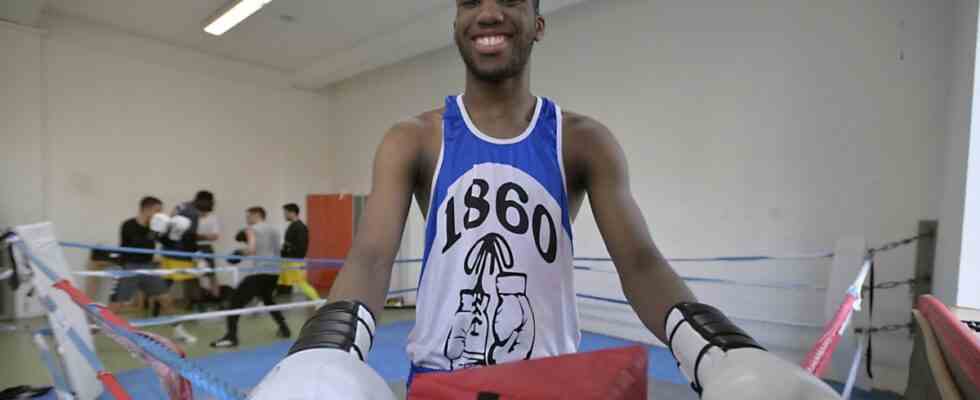Don’t be alarmed, says Rachach Pekpassi in greeting – he grins. He means the musty smell that is omnipresent in the old gym and immediately hits the nose. “That’s still the sweat of 1914,” he laughs now. The gymnasium at Munich Auenstraße 19 has been there for more than 100 years. The office of TSV 1860 Munich, for which Pekpassi works as a boxing trainer, was once located here. This Tuesday, 17 boxers prance under his guidance through the clearly aging hall. There is a red box on the windowsill from which the trainees are exposed to music. The sounds are only interrupted by the box gong on Pekpassi’s mobile phone, which marks the beginning and end of the exercise intervals.
Randy Botikali is the only one whose head is covered by a hood that hides his dyed blue hair. It’s time to sweat it off, the next Bundesliga fight is coming up at the weekend, so the weight has to be right. The 18-year-old is boxing a strong debut season, he has won four of his five Bundesliga fights so far.
That was not to be expected a few years ago, because Botikali’s entry into the world of boxing was rather bumpy: he lost all of his first ten fights. Botikali was a “training world champion”, says Pekpassi, but in the fight he lacked the mental strength – and the unconditional focus. “His mind was elsewhere during the fights.” The defeats would have saddened the lad, many his age quickly stop with such negative combat experiences. But the lion coaches encouraged him and motivated him not to give up. Because they had recognized that Botikali has a lot that makes a good boxer: good reactions, fast legs, good eyesight. Which expresses Botikali’s battle name “The black Flash”. Boy, believe in yourself, keep going, Pekpassi kept telling the dejected Botikali when they took the S-Bahn back to Munich after his first fights. The boxing department didn’t have minibuses back then. Pekpassi also said: “Hang on, you’ll be world champion.”
“Randy for me is the Muhammad Ali at a young age,” says 1860 department head Ali Cukur, who once finished fifth in the World Championships
World champion – the title is on the top shelf, and those responsible for the lions believe the 18-year-old is capable of it. Even the biggest name in boxing history is often mentioned in connection with Botikali: Muhammad Ali. “The way he moves, how he dances, his footwork: For me, Randy is Muhammad Ali at a young age,” says Ali Cukur in a calm voice. Cukur has been in the boxing business since the 1970s, joining the lions in 1974. He finished fifth at the amateur world championships, has been a coach at TSV since 1988 and took over as head of department in 1997. Cukur has seen many come and go, but nobody like Botikali has been there. “The Randy is something special”, the greatest talent he has accompanied so far. Cukur’s eyes gleamed as he explained that Muhammad Ali’s first coach wanted him to be banned from prancing in the ring because it was thought at the time that it didn’t allow for hard punches. Instead, Ali became a legend with his then unconventional style. “Float like a butterfly, sting like a bee”: Muhammad Ali’s motto should also take Botikali far.
The 18-year-old is not lacking in self-confidence. In the best Muhammad Ali manner, he says he wants to leave “my own legacy”. Botikali is sitting in the weight room, which doubles as a locker room, when he talks about himself. Worn barbells and old car tires are strewn across the floor, and the large mirror that dominates the room has been badly demolished. The scenery makes it clear why Pekpassi says about the general conditions in the hall: “The body sucks, but the engine runs.”
“I was a problem child,” says Botikali – he found a home in boxing. What he still lacks is German citizenship
“I don’t want to go his way,” says Botikali when asked about Muhammad Ali, from whom he has studied many fights. “A similar one, but my own.” When it comes to “greatness”, however, it’s welcome to go in the direction of Ali. Botikali is firmly convinced that he will “become the best of my generation”. His next goal is the 2024 Olympic Games in Paris, after which he wants to turn professional. What he still lacks is German citizenship. Although he was born in Munich, he is still Congolese, like his father. The naturalization procedure is underway, if it is successful, his way to a German Olympic base is free. There are already letters of recommendation from the German Boxing Association, and contacts have already been made with the sports promotion group of the Bavarian police. Before that, you still have to finish the final school year.
As a child, Botikali was impatient, easily provoked and therefore often aggressive, he now says calmly between dumbbells and old car tires. When there were arguments and physical altercations at school, he was usually at the forefront. “I was a problem child,” he says. His father sent him to judo and kickboxing, but he didn’t really like either of them. It wasn’t until boxing that he found his sporting home. His big brother took him to TSV 1860 when he was 13 – and triggered his first sporting longing: to become better than his big brother. To achieve this goal, he quickly accepted the advice of his trainers and eventually fell in love with boxing. “When I box, I feel different,” he says, “different” is meant in a positive way. Botikali has found his calling.
And the initial difficulties in the ring? Long forgotten. “He grew out of it,” says Pekpassi, while outside, on the opposite bank of the Isar, people are strolling in the afternoon sun. “Nothing shocks him anymore, now anyone can come. Randy is ready.”

